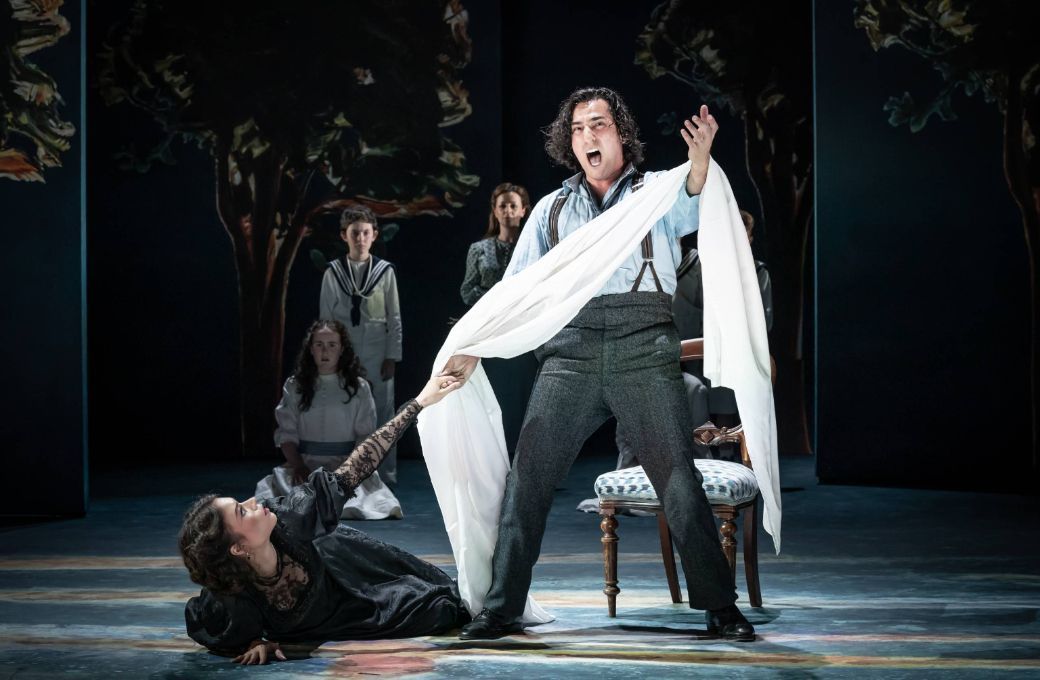“It is doomed to flop.” So declared Léon Carvalho the director of the Opéra Comique in 1887 when confronted with the sketches of Jules Massenet’s Werther. (Much the same was predicted for Tchaikovsky’s First Piano Concerto and look what happened there!) Even after Werther’s 1892 Vienna premiere, it took some years before the public warmed to the meagre plot about a young idealistic poet who commits suicide because the woman he loves (and who loves him) marries another man. Drawn from Goethe’s epistolary novel The Sorrows of Young Werther, Massenet created a lavishly scored work, its heart-on-sleeve romanticism wonderfully realised above and below the stage in Grange Park Opera’s new production at the Theatre in the Woods. Directed by John Doyle with Edwardian costumes from Gabrielle Dalton, this Werther is intensely gripping.
The anywhere set may be somewhat paltry – a park bench and two leafy trees – but Doyle’s less-is-more principle draws attention to Massenet’s opulent score and a narrative which prizes duty over passion, where instinct and emotion are sublimated to virtue and reason. Happiness is excluded for both the archetypal nature-loving dreamer (echoes here of Caspar David Friedrich’s solitary figures) and the repressed God-fearing wife who is the very opposite of the 19th-century femme fatale.

Alienation and rigidity seem to be key to Doyle's production where even the distance between trees and benches suggest the emotional gulf between husband and wife. Likewise, the regimented movements of the Von Trapp-like children who march about in straight lines parallel society’s unbending conventions in this 1905 setting. While steadily encroaching trees seem to crowd Werther’s unravelling mind, the literal-minded may wonder why the trees never shed their leaves as autumn turns to winter.
That aside, Werther depends on close, subtle interactions between the two leads. In this, we were handsomely rewarded by two singers whose voices and personalities commanded the stage from their first entrances. In the title role, Leonardo Capalbo fully provided the necessary romantic credentials with his bel canto that traversed his opening eulogy to nature through to his passionate death cries. His bravura manner, a little unwieldy at times, was delivered with tremendous fervour, ravishing in “Pourquoi me réveiller?” and always underlining the self-absorbed and self-destructive lover that he is. Ginger Costa-Jackson, as the dutiful and maternal Charlotte, was no less impassioned, her dark-hued mezzo thrilling in Act 3’s letter scene, where she unleashed her inner turmoil in a performance of blazing intensity.
Elsewhere, the ‘safe pair of hands’ that is her dull husband, Albert, was sung with suitable rectitude by Dominic Sedgwick and Charlotte’s younger sister Sophie was given a well-defined, fresh-voiced outing by Iria Perestrelo. Her playful gestures made a lively foil to the stiff manners of her siblings who bookend Werther with their neatly sung Christmas carolling. Alan Ewing was a proud Bailiff, while his drinking friends Schmidt (Robin Horgan) and Johann (Ross Cumming) were both credible cameos.
In the pit, Christopher Hopkins drew splendid playing from The Gascoigne Orchestra, coaxing out Massenet’s rich colouring and, in explosive climaxes, mirroring the emotional agitation playing above them on-stage. In short, both playing and singing are unmissable, with Werther’s dramatic strengths fully realised.


